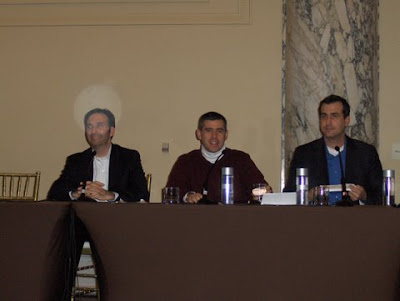
Not quite what he imagined after four years training to be the next Ian McKellan – but there are worse things than standing on a chair in your socks in a Trust House Forte conference room, encouraging your audience to Discover Their Inner Corporate Clown. Apparently.
With his biggest success a Domestos advert for Taiwan, Andrew took to arts-based training with evangelical fervour. After all, he could talk the back legs off a pantomime horse (he’d had enough experience at the Bedford Corn Exchange). Training, he claims, need never be boring again. Just terribly embarrassing.
Initially the response if encouraging – even to his breathy announcement that this is a safe, non-judgemental environment where risk-taking is encouraged. What is business anyway, his trainees gamefully reason, but a farce or tragedy with frequent opportunities for melodrama?
Andrew is going to take them on a Life-Changing Journey. Whether it’s Re-discovering the Internal Communications Vision or Exploring the Values of Corporate Play, it will Burrow Deep into the Heart of Everyone’s Workplace. Twenty-six customer-care supervisors and middle managers are asked to feel their partner’s life force.
Everything is a story, it seems, and Shakespeare wrote his plays to deal with issues of call centre communication and appraisal interviewing. Who can see Hamlet and not think of the MBA’er faced with the problem of re-branding his plc? Certainly no one except Andrew, which is why he now gets groups to role-play To Be Or Not To Be (Clarifying the Mission Statement), Hamlet and the gravedigger (Dealing With Difficult People in a Customer-Care Situation) and the final banquet scene (Corporate Hospitality: the Way Ahead).
Several hours later some people are considering applying for I’d Do Anything: the rest think about doing a runner but can’t find their shoes. They wonder if anything worse can happen. It can.
Because now Andrew announces that it’s time to explore Living With Corporate Uncertainty – Human Resources has hinted at some serious downsizing – with installations and human tableaux using bubble-wrap, newspaper and toilet rolls. This is the Blue Peter from hell. By the end of the afternoon their facilitator stands victorious amid a three-year-old’s mess fest and people in Marquis de Sade positions. He asks about their new perspectives and someone proudly waves their bubblewrap Mr Blobby.
What the point of the day is nobody knows, but, at least it keeps Andrew out of the community that little bit longer. And anyway there’s no point in screaming – on a traffic island near the M25 no one can hear you scream.
He likes to say ...
‘Hands up who’s in the Zone?’
‘You know you’d like to do a dance drama to Edward de Bono’s Six Thinking Hats’
‘Ask your partner if you can feel her aura.’
‘Please don’t all sit at the back.’






